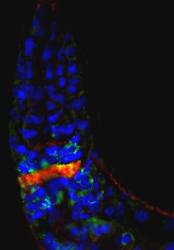Molecular Biology of Neurodegeneration Laboratory

Expression of human beta-amyloid peptide (green) in nerve ring (red) of transgenic C. elegans worm (cell nuclei in blue)
Department of Integrative Physiology
University of Colorado Boulder
354 UCB
Boulder, CO 80309-0354
phone: 303-735-5112
fax: 303-492-4009
Research Interests
The long-term goal of our research is to understand the cellular and molecular basis of age-associated neurodegenerative diseases, such as Alzheimer's disease (AD) and Amyotrophic Lateral Sclerosis (ALS). The major focus of our studies has been the identification of the cellular and molecular mechanisms by which specific proteins central to these diseases (e.g., the beta amyloid peptide in AD and TDP-43 in ALS) induce pathology. Our primary approach has been to develop transgenic C. elegans strains that express these human proteins, often resulting in abnormal phenotypes that can be the basis of classic genetic screens. The overall rationale for this approach is that invertebrate models allow facile "pilot" studies that are time-consuming, difficult, or impossible in other systems. We complement the C. elegans studies using mammalian cell culture and bioinformatic analysis of mouse and human deep sequencing data.
See our detailed Molecular Biology of Neurodegeneration Lab website for the most up-to-date information.
Personnel
- Director: Christopher D. Link, Ph.D.
- Research Associate: Thomas LaRocca, Ph.D.
- Graduate Students: Andrea Mariani, Marko Melnick.
- Professional Research Assistant: Christime M. Roberts.
- Professional Research Associate: Patrick Gonzales.
- Undergraduate Researcher: Naomi Iverson.
- Collaborators: Gretchen Stein, University of Colorado, Boulder; Leonard Petrucelli, Mayo Clinic; Yuan Luo; University of Maryland; David Sattelle, Universiity of Oxford; Nikos Robakis and Chrales Mobbs, Mt Sinai Medical School; Antonio Miranda Vizuete, Universidad Pablo de Olavide.
Current Research Projects
- TDP-43, RNA Metabolism, and ALS/FTD Pathology
- Abeta Oligomers and mechanisms of Neuronal Cell Death in Alzheimer's Disease
- Transcriptome analysis in iPSC-derived and reprogrammed neurons from Down Syndrome cells
- Is there a brain microbiome?
Recent Publications
For recent publications, visit our Molecular Biology of Neurodegeneration website.

